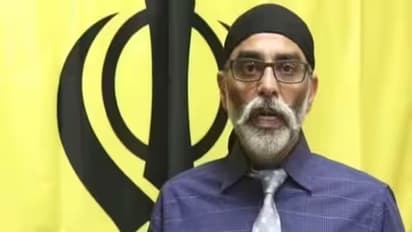Accused no longer Indian Govt employee, satisfied with cooperation: US on Pannun 'assassination' probe (WATCH)

Synopsis
The United States expressed satisfaction with the ongoing cooperation from the Indian government following a high-level meeting with an Indian inquiry committee investigating the foiled assassination plot of Khalistani terrorist Gurpatwant Singh Pannun.
The United States expressed satisfaction with the ongoing cooperation from the Indian government following a high-level meeting with an Indian inquiry committee investigating the foiled assassination plot of Khalistani terrorist Gurpatwant Singh Pannun. During a press briefing on Wednesday, State Department spokesperson Matthew Miller confirmed that the Indian authorities provided key updates about their investigation, which has been closely monitored by Washington.
Miller noted that during the meeting, Indian officials informed US representatives that the individual accused of directing the assassination attempt on US soil is "no longer an employee of the Indian government." This update follows widespread international attention on the case, which has raised tensions between the two nations.
“We’ve received an update from them on the investigation that they have been conducting. It was a productive meeting,” Miller stated. He emphasized that the US government was "satisfied with the cooperation" from India. “We continue to work with them on that, but we do appreciate the cooperation, and we appreciate them updating us on their investigation as we update them on ours," he added. However, Miller declined to provide specifics about any future meetings with the Indian inquiry committee.
The foiled assassination plot of Pannun, a Khalistani separatist leader with dual US-Canadian citizenship, has remained a focal point in ongoing diplomatic discussions between Washington and New Delhi. Pannun is wanted in India under terror charges and has been designated a terrorist under India’s Unlawful Activities (Prevention) Act (UAPA) for his role in promoting Khalistani separatism. He leads the banned outfit Sikhs for Justice (SFJ), which advocates for an independent Sikh state in India’s Punjab region.
The investigation into the assassination plot began in November 2023, when US prosecutors charged Nikhil Gupta, an Indian national, for his involvement in the conspiracy, alongside an alleged Indian government official. Gupta was arrested in the Czech Republic in June 2024 and was extradited to the United States on June 14. Upon extradition, Gupta appeared before a federal court in New York, where he pleaded not guilty to charges of murder-for-hire and conspiracy to commit murder-for-hire. If convicted, he faces up to 10 years in prison for each charge.
The US Justice Department indictment revealed that the alleged assassination plot targeted Pannun, who had been residing in New York. The indictment also implicated an unnamed Indian government official, which sparked international concerns and demands for transparency in the investigation. Indian officials have denied any involvement in the plot and have reiterated their commitment to fully cooperate with the US inquiry.
In response to the serious accusations, the Indian government set up a high-level inquiry committee tasked with investigating not only the foiled plot but also the activities of organized criminals allegedly involved. The Indian authorities have consistently denied any role in the assassination attempt, and the inquiry aims to clarify the circumstances surrounding the charges brought forward by US prosecutors.
The foiled plot to assassinate Pannun has added a layer of complexity to US-India relations, particularly amid broader geopolitical discussions involving counterterrorism efforts and regional stability. Pannun’s activities and inflammatory rhetoric advocating for a separate Khalistan have made him a controversial figure both in India and within the global Sikh diaspora. His designation as a terrorist in India has further fueled tensions, with both Canada and the US continuing to navigate the delicate balance of addressing Khalistani separatism while maintaining strategic relations with New Delhi.
Check the Breaking News Today and Latest News from across India and around the world. Stay updated with the latest World News and global developments from politics to economy and current affairs. Get in-depth coverage of China News, Europe News, Pakistan News, and South Asia News, along with top headlines from the UK and US. Follow expert analysis, international trends, and breaking updates from around the globe. Download the Asianet News Official App from the Android Play Store and iPhone App Store for accurate and timely news updates anytime, anywhere.